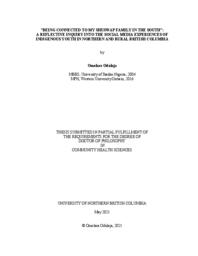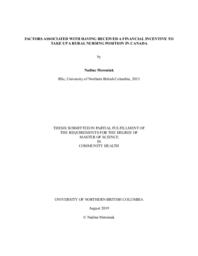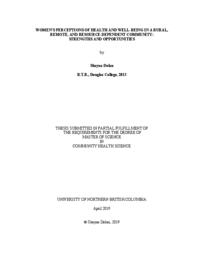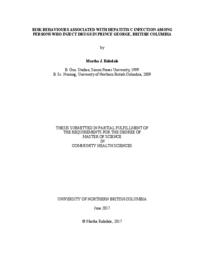University of Northern British Columbia. Community Health
Related Works
Content type
Digital Document
Description / Synopsis
This research extends and explores two key concepts. First, cultural preservation is important to Indigenous health and wellbeing. Second, when Indigenous youth spend quality time (whether online or offline) on issues pertaining to their identity and sense of self, that time can be key to preserving Indigenous cultures. This research project was an exploratory study carried out using a variety of research methods, including online surveys, semistructured interviews, and open ended storytelling engagements. In this study, youth ages 15 to 24 years interacted with one another in online and offline spaces, which in some cases served as culturally safe wellbeing sites where their self-esteem increased, especially if they were mentored by Indigenous peers and adults. This study found out that Indigenous youth are active social media users and engage in all kinds of activities including self presentation, social connections, cultural activities, and advocacy. The risks and benefits of using social media for identity expression and cultural engagement were identified, but some youth were noted to require supports to engage safely on social media to derive maximum benefits. The interdisciplinary nature of the research merges concepts, theories, and ideas from First Nations Studies, Sociology, Community Health, and Media Studies. This project embraced methodologies employed in these various disciplines but used a Two-Eyed Seeing framework as a tool to ensure cohesiveness in the research and respect for Indigenous cultures and cultural protocols. The research ultimately unfolded using lenses of both Indigenous and nonIndigenous worldviews, which I believe contributed greatly to the richness of the findings.
Origin Information
Content type
Digital Document
Description / Synopsis
In Canada, financial incentives are used to entice nurses to rural practice. While financial incentives are used throughout Canada, the characteristics of nurses who have received a financial incentive are seldom examined. The purpose of the study is to examine what factors are associated with having received a financial incentive to practice in rural and remote Canada. A pan-Canadian survey was distributed to nurses working in rural and remote Canada. The survey received a 40% response rate (n=3,822). Of the 3,822 eligible nurses who responded 12.6%(n=466) of nurses identified as having received a financial incentive to take up their rural nursing position. Chi-square and multiple logistic regression analyses found characteristics and other factors associated with having received a financial incentive to take up a rural nursing position. The study concludes that financial incentives continue to have implications for recruitment of nurses to practice in rural Canada.
Origin Information
Content type
Digital Document
Description / Synopsis
This research sought to explore the perceptions of health and well-being for women in a rural and remote northeastern British Columbia community experiencing intense social, ecological, and economic change as a result of its dependence on natural resource extraction. Designed as a qualitative inquiry into the health of local women, this research is informed by social constructivism, feminist theory, and ecosystems approaches to health. Engagement with participants and data collection was heavily influenced by Appreciative Inquiry, a strengths-based approach that identifies assets within a given system with the aim of contributing to positive change. Findings indicate that equitable access, perceptions of people and place, and leadership, communication, and collaboration are factors that strongly impact women’s health and in this context.
Origin Information
Content type
Digital Document
Origin Information




